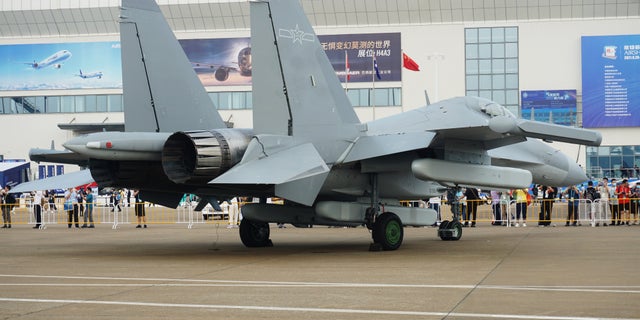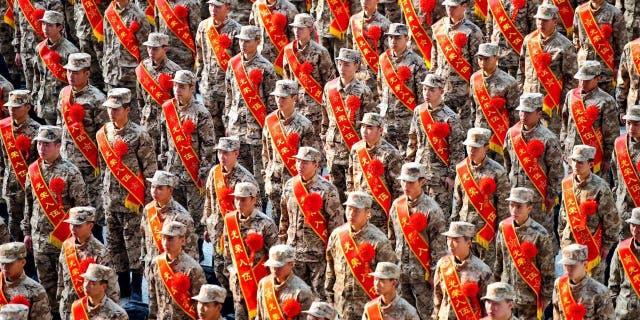
I have been watching the Netflix series “The Flash” – who, when he’s not zapping super villains and visiting the past and future, wrestles with some interesting human questions.
The often-anguished Flash can’t resolve how he can rescue so many people in his city, but inflict such pain on his circle of friends and himself. (This is the old streaming series, not the Warner Bros. movie that recently flopped.)
It may be a weird comparison – okay, it is a weird comparison – but American officials have spent zillions on faraway wars while voters understandably wonder why more isn’t spent on massive needs at home.
TRUMP VS. BIDEN IS NOT JUST ABOUT INDICTMENTS OR POLITICAL BATTLES, IT’S WARFARE
Let me say right up front that this isn’t an argument against foreign wars or foreign aid, though I would make the case against U.S. involvement in stupid wars.
The Bush administration marched into Afghanistan in 2001, understandably trying to get Osama bin Laden after 9/11, but what followed was two decades of American deaths followed by the chaotic and fatal withdrawal during the Biden years.

A convoy of the Iraqi army and the Hashed al-Shaabi (Popular Mobilisation), patrol in the Western part of Iraq’s Niniveh governorate, to pursue the remnants of the Islamic State (IS) groupe, on October 12, 2022. (Photo by ZAID AL-OBEIDI/AFP via Getty Images)
George W. Bush intervened again in Iraq in 2003, based on what turned out to be the false assumption that Saddam Hussein had weapons of mass destruction. While Saddam was a brutal dictator, too many American lives were lost as we stubbornly stayed there and escalated our involvement in a bloody civil war that was not ours to fight.
During those same two decades, China stayed out of war and further built what is now the world’s second-largest economy. Don’t get me wrong: China is a brutal dictatorship that has horribly mistreated its Uyghur minority, including forced labor camps. But it has not gotten bogged down in a 20-year foreign war.
TRUMP’S JAN. 6 INDICTMENT TURNS ON WHETHER HE KNOWINGLY LIED ABOUT THE 2020 OUTCOME
In a major Washington Post scoop, Chinese military hackers in 2020 obtained deep access to America’s most important ally in the Pacific, Japan. The Japanese have been trying to tighten their online defenses.
Why haven’t you heard more about this? The Trump Show is still the dominant story.

A view of J-16D aircraft for the electromagnetic warfare exhibited at the 13th China International Aviation and Aerospace Exhibition, or Airshow China 2021, in Zhuhai in south China’s Guangdong province Wednesday, Sep. 29, 2021. (Feature China/Future Publishing via Getty Images)
More recently, Chinese cybersleuths have hacked into the accounts of the U.S. Commerce Secretary and Ambassador to Beijing. Why aren’t these considered acts of war?
But even if they were, along with the Chinese spy balloon and a listening post established on Cuba, what would the U.S. do about it? We could punish Beijing economically, but we’d also be hurting ourselves as it’s a major trading partner.

New recruits of Chinese People’s Liberation Army (PLA) attend a send-off ceremony at a railway station in Ganzhou, Jiangxi province, China March 16, 2023. (China Daily via REUTERS )
China is a nuclear power, there’s no question America doesn’t want war with China, and I don’t believe the Chinese want war with the Americans.
What China wants is Taiwan.
That would have been unthinkable a few years ago. Every president, including Joe Biden, has pledged to protect Taiwan, which has been a thriving democracy since it broke away from the mainland a half century ago.
But the real test of American resolve is Ukraine. After the unprovoked Russian invasion that continues to intentionally slaughter civilians, the United States should consider itself fortunate that the brave Ukrainians are fighting so intensely. No American boots on the ground, but tens of billions in aid from America and its western allies to upgrade Kyiv’s outdated military capabilities.
It’s a small price to pay, considering that Putin cannot be allowed to succeed, or else he’ll try to gobble up other pieces of the old Soviet empire.
SUBSCRIBE TO HOWIE’S MEDIA BUZZMETER PODCAST, A RIFF ON THE DAY’S HOTTEST STORIES
But there are rumblings, especially among some Republicans, that Ukraine is draining our own resources. You keep hearing the phrase “no blank check.” And China, which is backing Russia, is watching that very closely.
What would happen if China invaded Ukraine? The U.S. is bound by a treaty to provide defensive weapons. In the worst-case scenario, we’d be sending American troops three-quarters of the way around the world to try to defeat Beijing on its own doorstep, with both countries holding nuclear arsenals.
CLICK HERE TO GET THE FOX NEWS APP
If American casualties started rising, public opinion would turn against that war – in a flash.